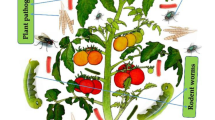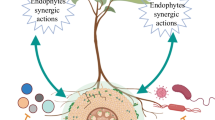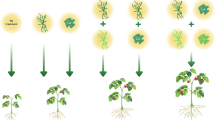Abstract
Purpose
Soil management exerts profound impact on the structure and function of the microbiome. Organic practice is believed to positively affect disease suppressiveness compared to conventional systems. While Pseudomonas has been established as a major player in conferring suppressiveness, the impact of farming practices on its diversity at species level has not been conclusively understood. Also, translation of such knowledge into application requires a mechanistic understanding of the mechanism of action of potent biocontrol strains of Pseudomonas.
Methods and results
We compared fields under conventional and organic farming, under long-term (~19 years) management. Profiling of Pseudomonas community structure using rpoD-based amplicon sequencing revealed a higher diversity of known antagonistic Pseudomonas spp. in soils sampled from organic fields compared to conventional field. Cultivation and genome sequencing of selected Pseudomonas isolates from the organic field identified species with multiple secondary metabolite biosynthetic gene clusters and antagonistic activity towards phytopathogens. The selected Pseudomonas isolates showed colonization of wheat root system as confirmed by scanning electron microscopy. In vitro tube assay using wheat also revealed the suppressive activity of potent Pseudomonas isolates against Fusarium oxysporum and Verticillium dahliae. Production of metabolites with antimicrobial activity was verified using untargeted metabolomics (LC/MS).
Conclusions
Overall, the mechanistics involved in the contribution of Pseudomonas spp. to disease suppressiveness in the field under organic farming could be established. This study reports that microbiome from organic field exhibits enhanced diversity of antagonistic Pseudomonas spp. effective against phytopathogens, compared to the conventional practice, and has the potential to promote sustainable agriculture and disease management.







Similar content being viewed by others
References
Achkouk I, Aarab S, Laglaoui A, Bakkali M, Arakrak A (2020) Isolation and screening of inorganic phosphate solubilizing pseudomonas strains from the Lotus creticus rhizosphere soil from the northwest of Morocco. In: Phyto-microbiome in stress regulation. Springer, Singapore, pp 99–111. https://doi.org/10.1007/978-981-15-2576-6_6
Ahmad F, Ahmad I, Khan MS (2008) Screening of free-living rhizospheric bacteria for their multiple plant growth promoting activities. Microbiol Res 163:173–181. https://doi.org/10.1016/j.micres.2006.04.001
Ankati S, Rani TS, Podile AR (2019) Changes in root exudates and root proteins in groundnut–Pseudomonas sp. interaction contribute to root colonization by bacteria and defense response of the host. J Plant Growth Regul 38:523–538. https://doi.org/10.1007/s00344-018-9868-x
Bakker AW, Schippers B (1987) Microbial cyanide production in the rhizosphere in relation to potato yield reduction and Pseudomonas spp.-mediated plant growth-stimulation. Soil Biol Biochem 19:451–457. https://doi.org/10.1016/0038-0717(87)90037-X
Berendsen RL, Vismans G, Yu K, Song Y, de Jonge R, Burgman WP, Pieterse CM (2018) Disease-induced assemblage of a plant-beneficial bacterial consortium. ISME J 12:1496–1507. https://doi.org/10.1038/s41396-018-0093-1
Bonanomi G, Zotti M, Idbella M, Di Silverio N, Carrino L, Cesarano G, Assaeed AM, Abd-ElGawad AM (2020) Decomposition and organic amendments chemistry explain contrasting effects on plant growth promotion and suppression of Rhizoctonia solani damping off. PLoS One 15:e0230925. https://doi.org/10.1371/journal.pone.0230925
Cazorla FM, Duckett SB, Bergström ET, Noreen S, Odijk R, Lugtenberg BJ et al (2006) Biocontrol of avocado Dematophora root rot by antagonistic Pseudomonas fluorescens PCL1606 correlates with the production of 2-hexyl, 5-propyl resorcinol. Mol Plant-Microbe Interact 19:418–428. https://doi.org/10.1094/MPMI-19-0418
Charlop-Powers Z, Owen JG, Reddy BVB, Ternei MA, Brady SF (2014) Chemical-biogeographic survey of secondary metabolism in soil. Proc Natl Acad Sci U S A 111:3757–3762. https://doi.org/10.1073/pnas.1318021111
D'aes J, Hua GKH, De Maeyer K, Pannecoucque J, Forrez I, Ongena M et al (2011) Biological control of Rhizoctonia root rot on bean by phenazine-and cyclic lipopeptide-producing Pseudomonas CMR12a. Phytopathology 101:996–1004. https://doi.org/10.1094/PHYTO-11-10-0315
De Corato U (2020) Soil microbiota manipulation and its role in suppressing soil-borne plant pathogens in organic farming systems under the light of microbiome-assisted strategies. Chem Biol Technol 7:1–26. https://doi.org/10.1186/s40538-020-00183-7
De Los S-VS, Barrera-Galicia GC, Miranda-Salcedo MA, Peña-Cabriales JJ (2012) Burkholderia cepacia XXVI siderophore with biocontrol capacity against Colletotrichum gloeosporioides. World J Microbiol Biotechnol 28:2615–2623. https://doi.org/10.1007/s11274-012-1071-9
De Schutter O (2011) The shift to low-carbon agriculture is becoming a matter of urgency. Statement by the UN Special Rapporteur on the right to food, World Food Day–16 October 2010. http://www.srfood.org/en/report-agroecology-and-the-right-to-food
Deltour P, França SC, Pereira OL, Cardoso I, De Neve S, Debode J, Höfte M (2017) Disease suppressiveness to Fusarium wilt of banana in an agroforestry system: influence of soil characteristics and plant community. Agric Ecosyst Environ 239:173–181. https://doi.org/10.1016/j.agee.2017.01.018
Dennert F, Imperiali N, Staub C, Schneider J, Laessle T, Zhang T, Maurhofer M (2018) Conservation tillage and organic farming induce minor variations in Pseudomonas abundance, their antimicrobial function and soil disease resistance. FEMS Microbiol Ecol 94:fiy075. https://doi.org/10.1093/femsec/fiy075
Dignam BE, O’Callaghan M, Condron LM, Kowalchuk GA, Van Nostrand JD, Zhou J, Wakelin SA (2018) Effect of land use and soil organic matter quality on the structure and function of microbial communities in pastoral soils: implications for disease suppression. PLoS One 13:e0196581. https://doi.org/10.1371/journal.pone.0196581
Durairaj K, Velmurugan P, Park JH, Chang WS, Park YJ, Senthilkumar P, ... Oh BT (2018) An investigation of biocontrol activity Pseudomonas and Bacillus strains against Panax ginseng root rot fungal phytopathogens. Biol Control 125: 138-146. https://doi.org/10.1016/j.biocontrol.2018.05.021
Durán P, Tortella G, Viscardi S, Barra PJ, Carrión VJ, Mora MDLL, Pozo MJ (2018) Microbial community composition in take-all suppressive soils. Front Microbiol 9:2198. https://doi.org/10.3389/fmicb.2018.02198
Engelke TH, Jagadish MN, Pühler A (1987) Biochemical and genetical analysis of Rhizobium meliloti mutants defective in C4-dicarboxylate transport. Microbiology 133:3019–3029. https://doi.org/10.1099/00221287-133-11-3019
Gómez Exposito R, De Brujin I, Postma J, Raaijmakers JM (2017) Current insights into the role of rhizosphere bacteria in disease suppressive soils. Front Microbiol 8:2529. https://doi.org/10.3389/fmicb.2017.02529
Gómez-Lama CC, Legarda G, Ruano-Rosa D, Pizarro-Tobías P, Valverde-Corredor A, Niqui JL, ... Mercado-Blanco J (2018) Indigenous Pseudomonas spp. strains from the olive (Olea europaea L.) rhizosphere as effective biocontrol agents against Verticillium dahliae: from the host roots to the bacterial genomes. Front Microbiol 9: 277. https://doi.org/10.3389/fmicb.2018.00277
Guevara-Avendaño E, Bejarano-Bolívar AA, Kiel-Martínez AL, Ramírez-Vázquez M, Méndez-Bravo A, von Wobeser EA, Reverchon F (2019) Avocado rhizobacteria emit volatile organic compounds with antifungal activity against Fusarium solani, Fusarium sp. associated with Kuroshio shot hole borer, and Colletotrichum gloeosporioides. Microbiol Res 219:74–83. https://doi.org/10.1016/j.micres.2018.11.009
Haas D, Keel C (2003) Regulation of antibiotic production in root-colonizing Pseudomonas spp. and relevance for biological control of plant disease. Annu Rev Phytopathol 41:117. https://doi.org/10.1146/annurev.phyto.41.052002.095656
Haas D, Défago G (2005) Biological control of soil-borne pathogens by fluorescent pseudomonads. Nat Rev Microbiol 3:307–319. https://doi.org/10.1038/nrmicro1129
Hesse C, Schulz F, Bull CT, Shaffer BT, Yan Q, Shapiro N, Hassan KA, Varghese N, Elbourne LDH, Paulsen IT, Kyrpides N, Woyke T, Loper JE (2018) Genome-based evolutionary history of Pseudomonas spp. Environ Microbiol 20:2142–2159. https://doi.org/10.1111/1462-2920.14130
Hoagland DR, Arnon DI (1950) The water-culture method for growing plants without soil. Circ- Calif Agric Exp Stn 347:1–32
Jayaraman S, Naorem AK, Lal R, Dalal RC, Sinha NK, Patra AK, Chaudhari SK (2021) Disease-suppressive soils—beyond food production: a critical review. J Soil Sci Plant Nutr 21:1437–1465. https://doi.org/10.1007/s42729-021-00451-x
Jung BK, Hong SJ, Park GS, Kim MC, Shin JH (2018) Isolation of Burkholderia cepacia JBK9 with plant growth-promoting activity while producing pyrrolnitrin antagonistic to plant fungal diseases. Appl Biol Chem 61:173–180. https://doi.org/10.1007/s13765-018-0345-9
Kalantari S, Marefat A, Naseri B (2018) Improvement of bean yield and Fusarium root rot biocontrol using mixtures of Bacillus, Pseudomonas and Rhizobium. Trop Plant Pathol 43:499–505. https://doi.org/10.1007/s40858-018-0252-y
Kamou NN, Dubey M, Tzelepis G, Menexes G, Papadakis EN, Karlsson M, Jensen DF (2016) Investigating the compatibility of the biocontrol agent Clonostachys rosea IK726 with prodigiosin-producing Serratia rubidaea S55 and phenazine-producing Pseudomonas chlororaphis ToZa7. Arch Microbiol 198:369–377. https://doi.org/10.1007/s00203-016-1198-4
Khatri S, Sharma S (2021) How does organic farming shape the soil-and plant-associated microbiota? Symbiosis 1:8. https://doi.org/10.1007/s13199-021-00767-3
Khatri S, Sazinas P, Shivay YS, Sharma S, Jelsbak L (2020) Complete genome sequence of Pseudomonas sp. strain SK, isolated from organic wheat rhizosphere. Microbiol Resour Announc 9:e00510–e00520. https://doi.org/10.1128/MRA.00510-20
Kiprianova EA, Smirnov VV (1981) Pseudomonas fluorescens, a producer of antibiotic substances. Antibiotiki 26:135–143
Kumar S, Stecher G, Li M, Knyaz C, Tamura K (2018) MEGA X: molecular evolutionary genetics analysis across computing platforms. Mol Biol Evol 35:1547. https://doi.org/10.1093/molbev/msy096
Lane DJ (1991) 16S/23S rRNA sequencing. Nucleic acid techniques in bacterial systematics. 115–175
Lauritsen JG, Hansen ML, Bech PK, Jelsbak L, Gram L, Strube ML (2021) Identification and differentiation of Pseudomonas species in field samples using an rpoD amplicon sequencing methodology. mSystems 6:e00704–e00721. https://doi.org/10.1128/mSystems.00704-21
Lemanceau P, Maurhofer M, Défago G (2007) Contribution of studies on suppressive soils to the identification of bacterial biocontrol agents and to the knowledge of their modes of action. In: Gnanamanickam SS (ed) Plant-associated bacteria. Springer, Dordrecht, pp 231–267. https://doi.org/10.1007/978-1-4020-4538-7_7
Li H, Cai X, Gong J, Xu T, Ding GC, Li J (2019) Long-term organic farming manipulated rhizospheric microbiome and Bacillus antagonism against pepper blight (Phytophthora capsici). Front Microbiol 10:342. https://doi.org/10.3389/fmicb.2019.00342
Liu H, Xiong W, Zhang R, Hang X, Wang D, Li R, Shen Q (2018) Continuous application of different organic additives can suppress tomato disease by inducing the healthy rhizospheric microbiota through alterations to the bulk soil microflora. Plant Soil 423:229–240. https://doi.org/10.1007/s11104-017-3504-6
Lori M, Symnaczik S, Mäder P, De Deyn G, Gattinger A (2017) Organic farming enhances soil microbial abundance and activity—a meta-analysis and meta-regression. PLoS One 12:e0180442. https://doi.org/10.1371/journal.pone.0180442
Lupatini M, Korthals GW, de Hollander M, Janssens TK, Kuramae EE (2017) Soil microbiome is more heterogeneous in organic than in conventional farming system. Front Microbiol 7:2064. https://doi.org/10.3389/fmicb.2016.02064
Lutz S, Thuerig B, Oberhaensli T, Mayerhofer J, Fuchs JG, Widmer F, Ahrens CH (2020) Harnessing the microbiomes of suppressive composts for plant protection: from metagenomes to beneficial microorganisms and reliable diagnostics. Front Microbiol 11:1810. https://doi.org/10.3389/fmicb.2020.01810
Matilla MA, Evans TJ, Martín J, Udaondo Z, Lomas MC, Rico JM, Salmond GP (2022) Herbicolin A production and its modulation by quorum sensing in a Pantoea agglomerans rhizobacterium bioactive against a broad spectrum of plant-pathogenic fungi. Microb Biotechnol A Brief Rep. https://doi.org/10.1111/1751-7915.14193
Mazurier S, Corberand T, Lemanceau P, Raaijmakers JM (2009) Phenazine antibiotics produced by fluorescent pseudomonads contribute to natural soil suppressiveness to Fusarium wilt. ISME J 3:977–991. https://doi.org/10.1038/ismej.2009.33
Mazzola M (2002) Mechanisms of natural soil suppressiveness to soilborne diseases. Antonie Leeuwenhoek 81:557–564. https://doi.org/10.1023/A:1020557523557
Mehrabi Z, McMillan VE, Clark IM, Canning G, Hammond-Kosack KE, Preston G, ... Mauchline TH (2016) Pseudomonas spp. diversity is negatively associated with suppression of the wheat take-all pathogen. Sci Rep 6:29905. https://doi.org/10.1038/srep29905
Mendes R, Kruijt M, De Bruijn I, Dekkers E, van der Voort M, Schneider JH, Raaijmakers JM (2011) Deciphering the rhizosphere microbiome for disease-suppressive bacteria. Science 332:1097–1100. https://doi.org/10.1126/science.1203980
Meyer SL, Everts KL, Gardener BM, Masler EP, Abdelnabby HM, Skantar AM (2016) Assessment of DAPG-producing Pseudomonas fluorescens for management of Meloidogyne incognita and Fusarium oxysporum on watermelon. J Nematol 48:43–53. https://doi.org/10.21307/jofnem-2017-008
Mulet M, Gomila M, Lemaitre B, Lalucat J, García-Valdés E (2012) Taxonomic characterisation of Pseudomonas strain L48 and formal proposal of Pseudomonas entomophila sp. nov. Syst Appl Microbiol 35:145–149. https://doi.org/10.1016/j.syapm.2011.12.003
Olorunleke FE, Kieu NP, Hofte M (2015) Recent advances in Pseudomonas biocontrol. In: Murillo J, Jackson RW, Vinatzer B, Arnold DL (eds) Bacterial-plant interactions: advance research and future trends. Caister Academic Press, Poole, pp 167–198. https://doi.org/10.21775/9781908230584
Palyzová A, Svobodová K, Sokolová L, Novák J, Novotný Č (2019) Metabolic profiling of fusarium oxysporum f. sp. conglutinans race 2 in dual cultures with biocontrol agents Bacillus amyloliquefaciens, Pseudomonas aeruginosa, and Trichoderma harzianum. Folia Microbiol 64:779–787. https://doi.org/10.1007/s12223-019-00690-7
Paulitz T, Nowak-Thompson B, Gamard P, Tsang E, Loper J (2000) A novel antifungal furanone from Pseudomonas aureofaciens, a biocontrol agent of fungal plant pathogens. J Chem Ecol 26:1515–1524. https://doi.org/10.1023/A:1005595927521
Pliego C, Ramos C, de Vicente A, Cazorla FM (2011) Screening for candidate bacterial biocontrol agents against soilborne fungal plant pathogens. Plant Soil 340:505–520. https://doi.org/10.1007/s11104-010-0615-8
Postma J, Schilder MT, Bloem J, van Leeuwen-Haagsma WK (2008) Soil suppressiveness and functional diversity of the soil microflora in organic farming systems. Soil Biol Biochem 40:2394–2406. https://doi.org/10.1016/j.soilbio.2008.05.023
Priyanka BA, Srivastava P, Sharma S (2022) Employing mutants to study the role of a three-membered bacterial consortium in growth promotion of Cajanus cajan. J Microbiol Methods 202:106589. https://doi.org/10.1016/j.mimet.2022.106589
Rathore R, Vakharia DN, Rathore DS (2020) In vitro screening of different Pseudomonas fluorescens isolates to study lytic enzyme production and growth inhibition during antagonism of Fusarium oxysporum f. sp. cumini, wilt causing pathogen of cumin. Egypt J Biol Pest Control 30:1–8. https://doi.org/10.1186/s41938-020-00259-4
Rosenzweig N, Tiedje JM, Quensen JF III, Meng Q, Hao JJ (2012) Microbial communities associated with potato common scab-suppressive soil determined by pyrosequencing analyses. Plant Dis 96:718–725. https://doi.org/10.1094/PDIS-07-11-0571
Sendi Y, Pfeiffer T, Koch E, Mhadhbi H, Mrabet M (2020) Potential of common bean (Phaseolus vulgaris L.) root microbiome in the biocontrol of root rot disease and traits of performance. J Plant Dis Prot 127:453–462. https://doi.org/10.1007/s41348-020-00338-6
Siegel-Hertz K, Edel-Hermann V, Chapelle E, Terrat S, Raaijmakers JM, Steinberg C (2018) Comparative microbiome analysis of a Fusarium wilt suppressive soil and a Fusarium wilt conducive soil from the Châteaurenard region. Front Microbiol 9:568. https://doi.org/10.3389/fmicb.2018.00568
Song W, Zhou L, Yang C, Cao X, Zhang L, Liu X (2004) Tomato fusarium wilt and its chemical control strategies in a hydroponic system. Crop Prot 23:243–247. https://doi.org/10.1016/j.cropro.2003.08.007
Tao C, Li R, Xiong W et al (2020a) Bio-organic fertilizers stimulate indigenous soil Pseudomonas populations to enhance plant disease suppression. Microbiome 8:137. https://doi.org/10.1186/s40168-020-00892-z
Tao X, Zhang H, Gao M, Li M, Zhao T, Guan X (2020b) Pseudomonas species isolated via high-throughput screening significantly protect cotton plants against verticillium wilt. AMB Expr 10:1–12. https://doi.org/10.1186/s13568-020-01132-1
Tienda S, Vida C, Lagendijk E, de Weert S, Linares I, González-Fernández J et al (2020) Soil application of a formulated biocontrol rhizobacterium, Pseudomonas chlororaphis PCL1606, induces soil suppressiveness by impacting specific microbial communities. Front Microbiol 11:1874. https://doi.org/10.3389/fmicb.2020.01874
Tyc O, Song C, Dickschat JS, Vos M, Garbeva P (2017) The ecological role of volatile and soluble secondary metabolites produced by soil bacteria. Trends Microbiol 25:280–292. https://doi.org/10.1016/j.tim.2016.12.002
Wang SY, Shi XC, Chen X, Laborda P, Zhao YY, Liu FQ, Laborda P (2021) Biocontrol ability of phenazine-producing strains for the management of fungal plant pathogens: a review. Biol Control 155:104548. https://doi.org/10.1016/j.biocontrol.2021.104548
Warnes MGR, Bolker B, Bonebakker L, Gentleman R, Huber W (2016) Package ‘gplots’. Various R Programming Tools for Plotting Data. https://www.scienceopen.com/document?vid=0e5d8e31-1fe4-492f-a3d8-8cd71b2b8ad9 (Accessed 10 Dec 2019)
Weller DM (2007) Pseudomonas biocontrol agents of soilborne pathogens: looking back over 30 years. Phytopathology 97:250–256. https://doi.org/10.1094/PHYTO-97-2-0250
Wells JS, Trejo WH, Principe PA, Sykes RB (1984) Obafluorin, a novel β-lactone produced by Pseudomonas fluorescens. J Antibiot 37:802–803. https://doi.org/10.7164/antibiotics.37.802
Wick RR, Judd LM, Gorrie CL, Holt KE (2017) Unicycler: resolving bacterial genome assemblies from short and long sequencing reads. PLoS Comput Biol 13:e1005595. https://doi.org/10.1371/journal.pcbi.1005595
Yanes ML, De La Fuente L, Altier N, Arias A (2012) Characterization of native fluorescent Pseudomonas isolates associated with alfalfa roots in Uruguayan agroecosystems. Biol Control 63:287–295. https://doi.org/10.1016/j.biocontrol.2012.08.006
Yang Z, Sun Y, Liu Q, Li A, Wang W, Gu W (2021) Design, synthesis, and antifungal activity of novel thiophene/furan-1, 3, 4-oxadiazole carboxamides as potent succinate dehydrogenase inhibitors. J Agric Food Chem 69:13373–13385. https://doi.org/10.1021/acs.jafc.1c03857
Yao TT, Xiao DX, Li ZS, Cheng JL, Fang SW, Du YJ, Zhu GN (2017) Design, synthesis, and fungicidal evaluation of novel pyrazole-furan and pyrazole-pyrrole carboxamide as succinate dehydrogenase inhibitors. J Agric Food Chem 65:5397–5403. https://doi.org/10.1021/acs.jafc.7b01251
Yasmin S, Hafeez FY, Mirza MS, Rasul M, Arshad HM, Zubair M, Iqbal M (2017) Biocontrol of bacterial leaf blight of rice and profiling of secondary metabolites produced by rhizospheric Pseudomonas aeruginosa BRp3. Front Microbiol 8:1895. https://doi.org/10.3389/fmicb.2017.01895
Yu JM, Wang D, Pierson LS III, Pierson EA (2018) Effect of producing different phenazines on bacterial fitness and biological control in Pseudomonas chlororaphis 30-84. Plant Pathol J 34:44–58. https://doi.org/10.5423/PPJ.FT.12.2017.0277
Zhang Q, Stummer BE, Guo Q, Zhang W, Zhang X, Zhang L, Harvey PR (2021) Quantification of Pseudomonas protegens FD6 and Bacillus subtilis NCD-2 in soil and the wheat rhizosphere and suppression of root pathogenic Rhizoctonia solani AG-8. Biol Control 154:104504. https://doi.org/10.1016/j.biocontrol.2020.104504
Zhao M, Yuan J, Zhang R, Dong M, Deng X, Zhu C, Shen Q (2018) Microflora that harbor the NRPS gene are responsible for Fusarium wilt disease-suppressive soil. Appl Soil Ecol 132:83–90. https://doi.org/10.1016/j.apsoil.2018.08.022
Acknowledgments
We would like to thank Jonas Greve Lauritsen for help with data analysis of Pseudomonas metagenomics and whole-genome sequencing. We are also grateful to Mario Wibowo for his assistance in carrying out the LC/MS experiments, and Annapurna Bhattacharjee for help with in vitro tube assay.
Funding
The authors would like to thank IIT Delhi and ICAR for providing financial assistance under the M-FIRP scheme (MI02024). We would also like to acknowledge the Danish National Research Foundation (DNRF137) for providing funding to the Center for Microbial Secondary Metabolites. SK received an exchange fellowship from Novozymes and the Henning Holck–Larsen Foundation. SK received fellowship from University Grants Commission (UGC) India.
Author information
Authors and Affiliations
Corresponding authors
Ethics declarations
Conflict of interest
The authors declare no conflict of interest.
Additional information
Responsible Editor: Birgit Mitter.
Publisher’s note
Springer Nature remains neutral with regard to jurisdictional claims in published maps and institutional affiliations.
Supplementary Information
ESM 1
(PDF 1.35 MB)
Rights and permissions
Springer Nature or its licensor (e.g. a society or other partner) holds exclusive rights to this article under a publishing agreement with the author(s) or other rightsholder(s); author self-archiving of the accepted manuscript version of this article is solely governed by the terms of such publishing agreement and applicable law.
About this article
Cite this article
Khatri, S., Sazinas, P., Strube, M.L. et al. Pseudomonas is a key player in conferring disease suppressiveness in organic farming. Plant Soil (2023). https://doi.org/10.1007/s11104-023-05927-6
Received:
Accepted:
Published:
DOI: https://doi.org/10.1007/s11104-023-05927-6




